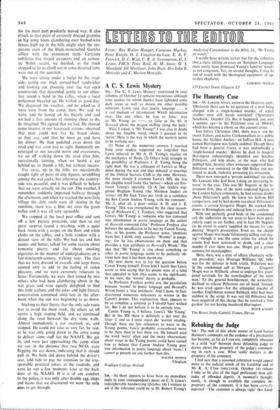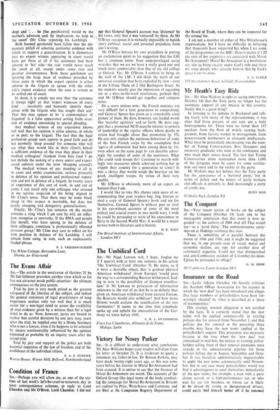Rebuking the Judge
SIR,—The nub of this whole matter of Lord Justice Harman's comments on the evidence of a psychiatrist has become, as far as I can see, completely obscured in a mild 'war' between those defending judge or doctor about the propriety of the judge's comment- ing in such a case. What really matters is the propriety of his comment.
I feel sure that a reasoned refutation would appeal more to the judicial minds of his Lordship and of Mr R. A. Cline (SPECTATOR, October 14) (whom I take to be also of the legal profession) than atti- tudes of offended dignity. A moment's thought, surely, is enough to establish the complete im- propriety of the comment, if it has been correctly reported—'The customer is always right' (his Lord-
ship) and . . he [the psychiatrist] would be the mother's advocate and, by implication, no help to the court' (Mr Cline reporting his Lordship).
Both learned gentlemen• have fallen into the ele- mentary pitfall of selecting particular evidence with which to support a generalisation. It is elementary that no expert witness appearing in court would have got there at all if his testimony had been adverse to 'his' side—the case would never reach the court at all, except under some rare and peculiar circumstances. Both these gentlemen are ignoring the large mass of evidence provided by those cases in which the expert opinion is either adverse to the litigant or agrees with the other side's expert evidence when the case is certain to be settled out of court.
In short, it is simply not true that 'the customer is always right' or that 'expert witnesses of every kind . . . inevitably and humanly identify them- selves with the litigant who has sought their aid.' That this may appear to be 'a commonplace of litigation' is a false appearance arising from selec- tion of evidence amounting to special pleading.
Any medical witness of any experience knows full well that his opinion is often adverse, in whole or in part, to the litigant. The fact that the legal profession accept such reports in good faith and do not normally 'shop around' for someone who will say what they would like in their client's behalf is sufficient evidence of the trust they place in their medical colleagues' freedom from bias (and I do not include the seeking of a more senior and experi- enced opinion under the term 'shopping around').
The medical witness of any standing at all is, in court and under examination, zealous primarily in defence of his opinion and professional reputa- tion and not in defence of a litigant. In twenty years of experience of this sort of work, in and out of court, I can recall only one colleague who aroused in me serious suspicion of his being aligned in Mr Cline's sense. That there may be some black sheep in this respect is inevitable, but does not justify sweeping and derogatory generalisations.
Finally, Mr Cline's last sentence on the matter contains a sting which I am sure he will, on reflec- tion, recognise as unworthy. If the BMA and people like myself, who have sprung to the defence of their colleague, constitute 'a professionally offended pressure group,' Mr Cline may care to reflect on his own position in defence of his Lordship. I will refrain from using, in turn, such an unpleasantly loaded phrase.
Shortie, nr. Gravesend







































 Previous page
Previous page